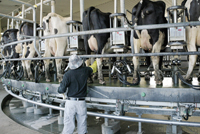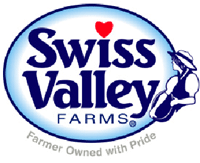 Here’s another reason to attend World Dairy Expo – a new time-saving and efficiency product called Dairymatic.
Here’s another reason to attend World Dairy Expo – a new time-saving and efficiency product called Dairymatic.
Dairymatic controls the milking and wash systems on dairy farms through special software. With over 250 alarms, the software can detect problems with the milking or wash systems and alert up to six different employees through email, fax or page.
In an article from the Central Penn Business Journal, Dwayne Zimmerman, president and chief executive officer of Power Automation Systems Inc. says, “From milk-temperature readings to automatically engaging the milk holding tank’s cleaning system, the technology keeps vital stats keystrokes away. Employee- production rates can be measured, milk flows to holding tanks more quickly, and alerts are automatically generated when a problem occurs in the milking area. Depending on farm size and the needs of the dairy operation, the price of the unit can range from $6,000 to $20,000.”
Couldn’t find a website or any other information about Power Automation Systems or Dairymatic on-line, except that they will be exhibiting at WDX and that they received a grant from Ben Franklin Technology Partners to develop the system in October of 2005.
The photo is from the Central Penn story. The cutline reads: Habrahan Santiz disinfects cow teats after the cows were milked by the new Dairymatic machine at Kreider Farms in Lancaster County. The treatment protects cows from infection. A West Hanover Township business produces Dairymatic, which can read milk temperatures and clean milk-holding tanks automatically. Photo/Lizzie Heard
 The 52nd National Jersey Queen will be selected Saturday, November 4 at the All American Jersey Shows in Louisville, Ky.
The 52nd National Jersey Queen will be selected Saturday, November 4 at the All American Jersey Shows in Louisville, Ky.
 Here’s the latest announcements from
Here’s the latest announcements from 
 Dairy Markets Week in Review
Dairy Markets Week in Review Here’s another reason to attend World Dairy Expo – a new time-saving and efficiency product called Dairymatic.
Here’s another reason to attend World Dairy Expo – a new time-saving and efficiency product called Dairymatic.

 Edward L. Mullins is the new Executive Vice President and Chief Executive Officer of
Edward L. Mullins is the new Executive Vice President and Chief Executive Officer of  The
The